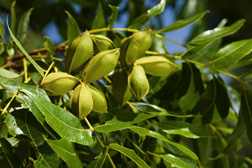This page has been archived and is being provided for reference purposes only. The page is no longer being updated, and therefore, links on the page may be invalid.
Read the magazine story to find out more. |
|
|
Pecan Growers Boost Revenue by Growing Organically
By Alfredo FloresNovember 4, 2008
Pecan growers might be able to boost their profits by growing pecans organically, according to Agricultural Research Service (ARS) scientists studying production systems for this popular tree nut.
U.S. growers provide about 90 percent of the world's pecans, with an annual crop of about 200 million pounds worth about $400 million. Pecans, popular in baked goods and confections, are a good source of protein and contain antioxidants and plant sterols thought to be beneficial to human health.
In 2002, ARS scientists led by Joe Bradford, research leader at the agency's Integrated Farming and Natural Resources Research Unit in Weslaco, Texas, began transitioning a 27-year-old, conventionally managed pecan orchard to a certified-organic-managed system. The 20-acre test site is located within the Gebert commercial pecan orchard in Comanche County in north-central Texas.
The primary objective of the project is to provide information to pecan growers on how to convert from conventional management systems that rely on synthetic chemicals to an organic system.
Contrary to conventional growers' expectations, the ARS organically treated test site out-yielded the conventionally managed, chemically fertilized Gebert orchard in each of the past five years. Yields on ARS' organic test site surpassed the Gebert commercial orchard by 18 pounds per tree in 2005, and by 12 pounds per tree in 2007.
The conventional management system generates about $1,750 per acre when the crop is sold. But the ARS certified-organic-management system would gross $5,290 per acre.
These greater dollar returns prove that adopting an organic system and obtaining certification could provide more income for pecan growers, thanks to increased yields and improved kernel quality.
Read more about this research in the November/December 2008 issue of Agricultural Research magazine.
ARS is a scientific research agency in the U.S. Department of Agriculture.

